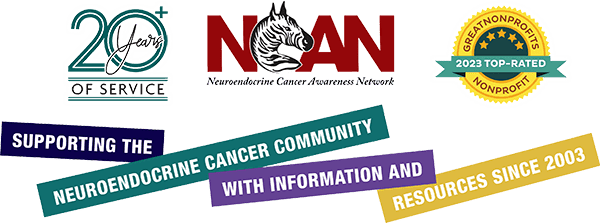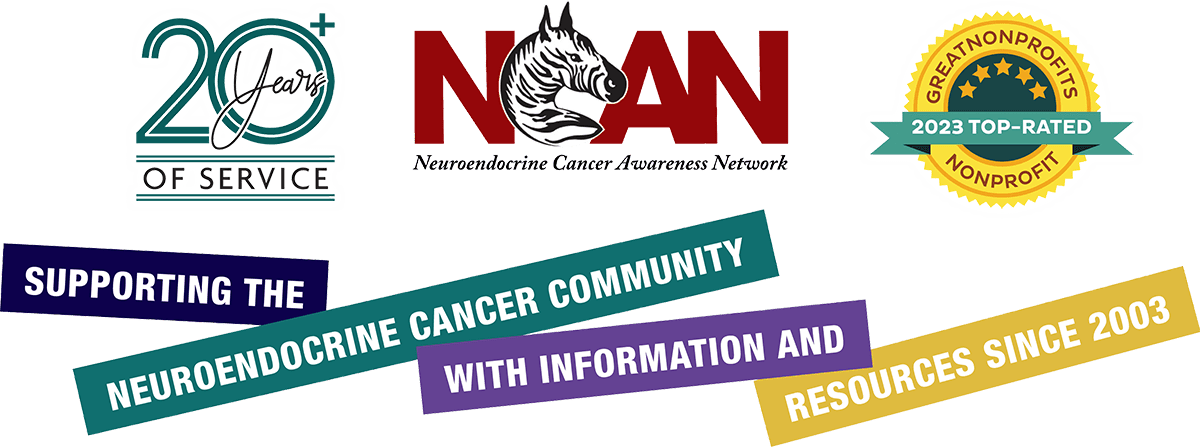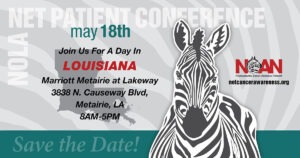April 1, 2023
By Anne Dabbs,
NCAN TN Support Group Leader, NET Patient
and
By Tom Wilson,
NCAN WI Support Group Leader, NET Advocate

As time marches on, many NETs patients may be prescribed new drugs, supplements, or vitamins from a range of providers from various clinics. Not only are these therapies expensive, but they may need to be taken at specific times, on an empty or full stomach, and taken at special times of the day, from the first thing in the morning (thyroid medication) to late at night (Afinitor).
As Tom Wilson, a NETs advocate and an NCAN Support Group leader writes, “My wife, Lynn takes 35 medications, supplements and vitamins—some only ‘as needed.” That still leaves about 22 that she takes daily. The term for this is polypharmacy.
Tom and Lynn share their new found knowledge and experience with us here:
Polypharmacy:
Polypharmacy refers to the concurrent use of multiple medications by a single patient. This practice is common in the treatment of complex or chronic medical conditions, where patients may be prescribed several drugs to address different symptoms or underlying health problems. However, the use of multiple medications (via multiple providers) can also increase the risk of adverse drug reactions and other negative outcomes, such as increased toxicity, reduced efficacy, and increased healthcare costs. As a result, healthcare providers should carefully consider the potential risks and benefits of polypharmacy, and regularly assess and adjust medication regimes as needed to minimize harm to patients.
Polypharmacy can create a burden for patients and their families. They need to understand the purpose and importance of the many prescriptions, get refills, take medication at the right time of day, and recognize side effects when they occur. When these prescriptions are written by multiple providers, perhaps at multiple facilities, the task of correctly taking the medications can become overwhelming.
What is needed is a specialized pharmacist to holistically review all of the patients medications. This service is called Medication Therapy Management. (MTM)

A MTM Specialized Pharmacist provides patient centered MTM services for the purpose of optimizing medication therapy to improve clinical, economic, and humanistic outcomes. The establishment of a qualifying process for a pharmacist to become a MTM specialist was established as part of the Medicare Modernization Act of 2003. A location resource for qualified MTM pharmacists can be found on the CDC.gov website. Medicare recipients can access this free service paid for by Medicare Part D for patients with at least 3 chronic conditions and taking at least 7 medications. Medicare Advantage Plan patients may find this option in some of the Advantage Plan offerings. Some employer offered supplemental health insurance plans may also offer a version of MTM as part of “advocacy services”, “healthy rewards”, or “speciality care programs”. Names and qualifications for this service can vary outside of the established Medicare Part D plans, but the benefits of such a service warrant the effort to determine if your insurance offers a similar plan.
The MTM Specialized Pharmacist might identify drugs that many no longer be needed. They might identify duplicates; they might identify conflicts of side effects. This process is called Deprescribing— the culling out of unnecessary drugs.

Compromised Continuity of Care:
Seeing multiple providers across specialities and clinics who are all prescribing different drugs can result in the patient’s continuity of care being compromised. For those patients with a chronic disease, the process of having a life style burdened by a medication regimen can lead to a reluctance to continue taking the drugs which are actually keeping their bodies as healthy as possible. These are just two of the reasons it may be helpful to have a MTM Specialized Pharmacist review your medications periodically.
Tom and Lynn share that they recently met with a pharmacist from Mayo’s hematology/oncology department which was paid in full by their Medicare Part D policy. The one hour Zoom call reviewed Lynn’s entire list of 35 medications. The pharmacist answered their numerous questions about timing, dosing, efficacy, and purpose of each drug. The pharmacist also explained the mechanism (how it works) of several of the drugs to give clarity and confidence to both Tom and Lynn. They were provided a written summary of the meeting including links to clinical trials which might be of value to Lynn’s care.
Tom and Lynn’s willingness to share their experience is an example of the continued efforts of our NCAN family to support, educate, and advocate for each other. Build your self-advocacy tools, and visit the NCAN Resource Room, where you’ll find helpful ways to navigate your Neuroendocrine journey. Better yet, join us at an Upcoming Event and come meet the family!
We are HERE for you if you need us.
Find out more about how YOU can help the NET Community.
Disclaimer: NCAN blog posts are the opinions of its writers and are not intended as a replacement for medical advice. Please consult your Health Care Providers for individual concerns.








Recent Comments